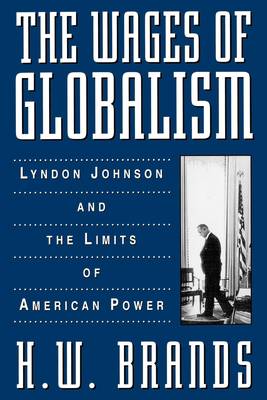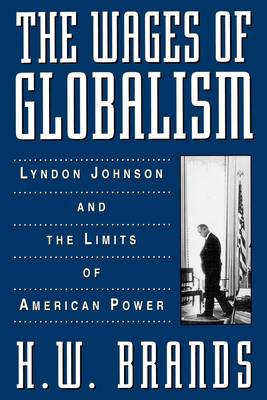
- Retrait gratuit dans votre magasin Club
- 7.000.000 titres dans notre catalogue
- Payer en toute sécurité
- Toujours un magasin près de chez vous
- Retrait gratuit dans votre magasin Club
- 7.000.000 titres dans notre catalogue
- Payer en toute sécurité
- Toujours un magasin près de chez vous
The Wages of Globalism
Lyndon Johnson and the Limits of American Power
H W Brands
Livre broché | Anglais
166,45 €
+ 332 points
Description
One episode dominates the memory of Lyndon Johnson's presidency: the Vietnam War. The war has so darkened Johnson's reputation that it is difficult for many to recall his policies in a positive light-- especially his foreign policy. Now historian H.W. Brands offers a fresh look at Johnson's handling of international relations, putting Vietnam in the context of the many crises he confronted and the outdated policies of global containment he was expected to uphold. The result is a fascinating portrait of a master politician at work, maneuvering through a series of successes that made his ultimate failure in Vietnam all the more tragic.
In The Wages of Globalism, Brands conducts a witty and insightful tour through LBJ's foreign policy--a tour that begins in Washington, runs through Santa Domingo, Nicosia, and Jakarta, and ends in Saigon. He opens with a thoughtful portrayal of the tense, often fruitful relationship between the domineering Johnson and his advisers--Dean Rusk, Robert McNamara, George Ball, Clark Clifford, Walt Rostow--as he picked up Kennedy's legacy and sought to make it his own. Leaving Vietnam for the end, Brands presents the various crises with all the force the White House felt at the time: the Dominican intervention, India impending famine and war with Pakistan, the coup against Sukarno in Indonesia, France's departure from NATO's unified command, the threat of fighting between Greece and Turkey over Cyprus, the Six Day War, and the worry that Germany might acquire nuclear weapons. In each, Brands captures the uncertainty in Washington and the conflicting advice that Johnson received. The picture that emerges is remarkably positive, revealing the president's ability to pick his way through fierce complexities. He forcefully stopped a war over Cyprus; handled de Gaulle with equanimity and skill; and--over the objections of all his advisers--intentionally delayed shipping grain to famine-threatened India, creating a real momentum for agricultural reform in that country that ultimately led to self-sufficiency. Only in Vietnam did Johnson's sure balance of determination and judgment break down: worried about his domestic program and the need to stand firm against aggression, he let his determination run away with him.
"In 1947," H.W. Brands writes, "Truman made a bad bargain with history." By the time Johnson inherited the White House, it had become painfully clear that America was no longer supreme in the world, able to prop up the status quo worldwide. In this fascinating, behind-the- scenes account, Brands shows how skillfully Johnson steered the nation into the new era--until, in Southeast Asia, politics and his own personality led him into the ultimate trap of the Truman Doctrine.
In The Wages of Globalism, Brands conducts a witty and insightful tour through LBJ's foreign policy--a tour that begins in Washington, runs through Santa Domingo, Nicosia, and Jakarta, and ends in Saigon. He opens with a thoughtful portrayal of the tense, often fruitful relationship between the domineering Johnson and his advisers--Dean Rusk, Robert McNamara, George Ball, Clark Clifford, Walt Rostow--as he picked up Kennedy's legacy and sought to make it his own. Leaving Vietnam for the end, Brands presents the various crises with all the force the White House felt at the time: the Dominican intervention, India impending famine and war with Pakistan, the coup against Sukarno in Indonesia, France's departure from NATO's unified command, the threat of fighting between Greece and Turkey over Cyprus, the Six Day War, and the worry that Germany might acquire nuclear weapons. In each, Brands captures the uncertainty in Washington and the conflicting advice that Johnson received. The picture that emerges is remarkably positive, revealing the president's ability to pick his way through fierce complexities. He forcefully stopped a war over Cyprus; handled de Gaulle with equanimity and skill; and--over the objections of all his advisers--intentionally delayed shipping grain to famine-threatened India, creating a real momentum for agricultural reform in that country that ultimately led to self-sufficiency. Only in Vietnam did Johnson's sure balance of determination and judgment break down: worried about his domestic program and the need to stand firm against aggression, he let his determination run away with him.
"In 1947," H.W. Brands writes, "Truman made a bad bargain with history." By the time Johnson inherited the White House, it had become painfully clear that America was no longer supreme in the world, able to prop up the status quo worldwide. In this fascinating, behind-the- scenes account, Brands shows how skillfully Johnson steered the nation into the new era--until, in Southeast Asia, politics and his own personality led him into the ultimate trap of the Truman Doctrine.
Spécifications
Parties prenantes
- Auteur(s) :
- Editeur:
Contenu
- Nombre de pages :
- 304
- Langue:
- Anglais
Caractéristiques
- EAN:
- 9780195113778
- Date de parution :
- 24-04-97
- Format:
- Livre broché
- Format numérique:
- Trade paperback (VS)
- Dimensions :
- 155 mm x 234 mm
- Poids :
- 430 g







